20 Unhealthy Foods You Should Eliminate From Your Diet, According To Nutritionists
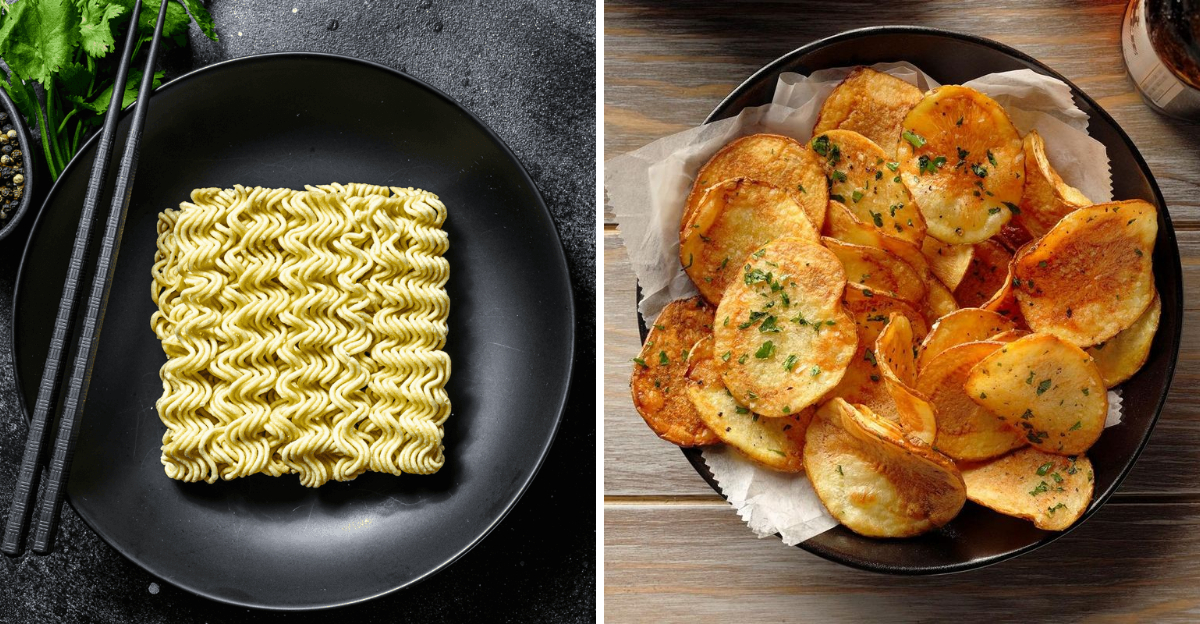
In today’s fast-paced world, many of us reach for convenient and tasty foods, but not all of them are beneficial for our health. Nutritionists often warn against certain foods that can be detrimental to our well-being. If you’re aiming for a healthier lifestyle, consider eliminating these 20 unhealthy foods from your diet. Each one comes with its own reasons for being on the naughty list, and by making better choices, you can pave the way towards improved health and vitality.
1. Sugary Cereals
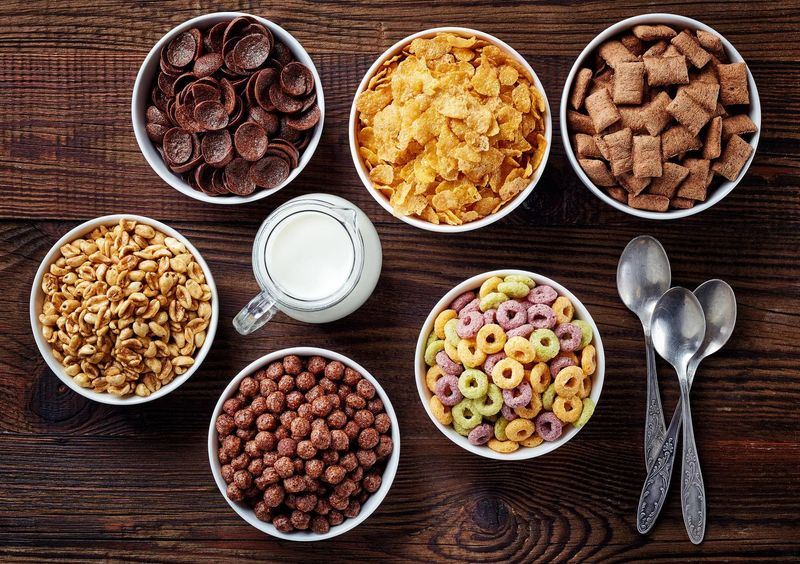
With their vibrant colors and sweet flavors, sugary cereals may delight children and adults alike, yet they often pack more sugar than a candy bar. Starting your day with such a sugar-laden breakfast can lead to energy spikes and crashes, leaving you tired and irritable.
The excessive sugar content also contributes to long-term health issues such as obesity and type 2 diabetes. To make your mornings healthier, consider whole-grain options with natural sweetness like fruits.
Did you know? Some of these cereals contain as much sugar in one serving as three chocolate chip cookies!
2. Soda

Soda, with its effervescent allure, is a popular beverage choice, yet it’s a significant source of empty calories and sugar. Regular consumption can lead to weight gain and increased risk of metabolic syndrome.
These fizzy drinks often contain high levels of fructose corn syrup, contributing to liver fat accumulation and insulin resistance. For a refreshing alternative, try flavored sparkling water or herbal teas.
In a fun twist, did you know that back in the day, sodas were considered medicinal tonics? Nowadays, moderation is key to enjoying this bubbly treat without compromising health.
3. Fried Foods

Fried foods like crispy chicken and golden fries are undeniably tempting, but the trans fats and calories they contain can wreak havoc on your health. Regular consumption is linked to heart disease due to bad cholesterol levels rising.
The cooking process also reduces essential nutrients, leaving you with a bellyful of empty calories. Consider baking or air frying for a healthier twist without sacrificing crunch.
Fun fact: the first known recipe for frying dates back to ancient Mesopotamia, but today’s fried food varieties have evolved significantly, often at the expense of health.
4. Processed Meats

Processed meats, such as ham, salami, and sausages, may offer convenience, but they are packed with preservatives and sodium. These additives can increase the risk of heart disease and certain cancers.
While these meats can make a sandwich more flavorful, their regular consumption is linked to negative health outcomes. Consider opting for fresh, lean cuts of meat as a healthier alternative.
Here’s a thought-provoking tidbit: nitrates used in processing can convert to harmful nitrosamines in the body, underscoring the need for cautious consumption of these meats.
5. Margarine

Once hailed as a healthier alternative to butter, margarine is now known to contain trans fats that can negatively affect heart health. These artificial fats increase bad cholesterol levels, posing risks to cardiovascular well-being.
Opt for spreads made with olive or avocado oil for a heart-friendly choice.
A quirky fact: margarine was invented in 1869 by a French chemist to provide a cheaper butter alternative for the armed forces. However, its composition has stirred debates among health experts over the decades.
6. Instant Noodles
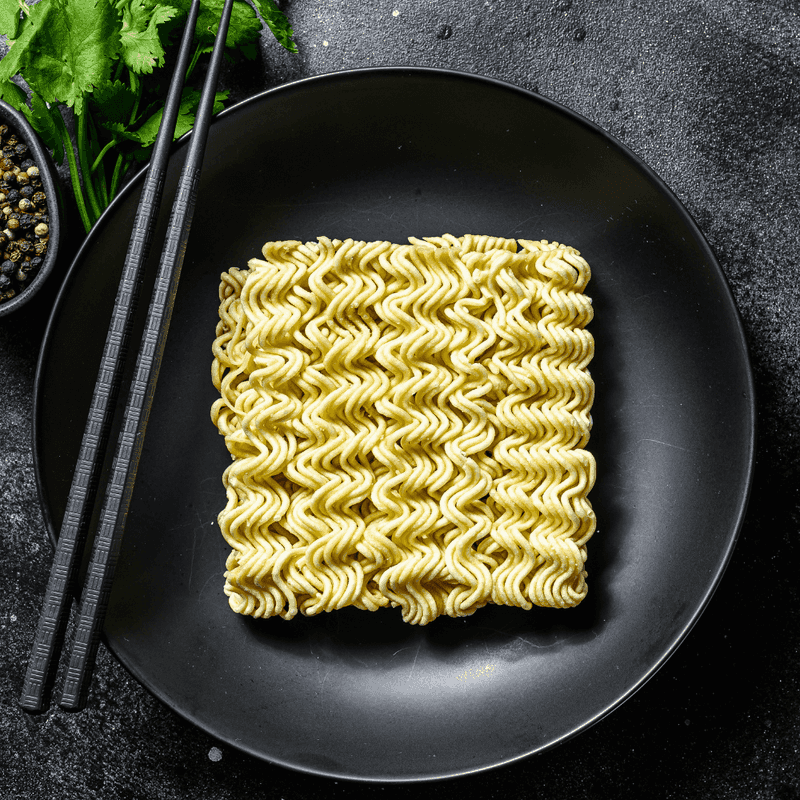
Instant noodles have become a quick go-to meal around the globe, but they are loaded with sodium and preservatives. Regular consumption can lead to high blood pressure and nutrient deficiencies.
These noodles are often low in fiber and protein, leaving you hungry shortly after eating. For a nourishing alternative, consider whole-grain noodles paired with fresh vegetables and lean protein.
Did you know? Instant noodles were invented in Japan in 1958, intended as a convenient post-war food solution, but modern nutritionists advise caution with their frequent consumption.
7. Pastries and Cakes

Pastries and cakes, with their sugary allure and creamy frostings, are often the highlight of celebrations, yet they are loaded with sugar and unhealthy fats. These sweet treats can lead to weight gain and dental issues if consumed regularly.
For those with a sweet tooth, occasional indulgence is fine, but daily consumption can take a toll on your health. Consider recipes with natural sweeteners for a healthier dessert option.
Here’s a historic tidbit: the ancient Egyptians were the first to show evidence of advanced baking skills, but modern cakes have far more sugar.
8. Potato Chips
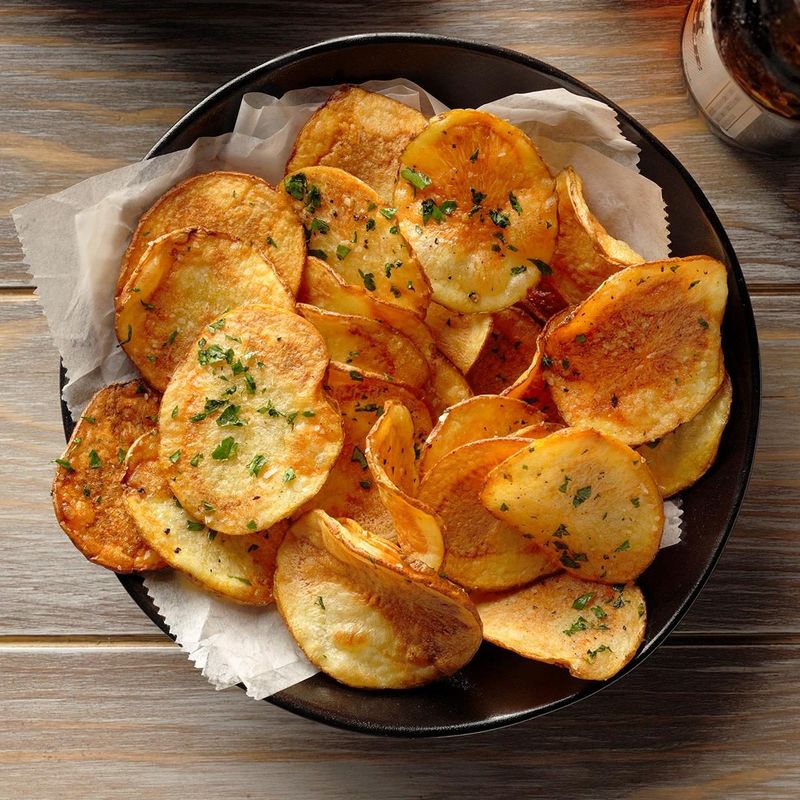
Potato chips, with their crispy texture and salty appeal, are a snacking favorite, yet they are high in sodium and unhealthy fats. Regular consumption can contribute to weight gain and high blood pressure.
Consider baked or air-popped chips for a less guilty indulgence, or explore crunchy alternatives like kale chips.
In an interesting nugget, potato chips were invented by accident in 1853 when a chef tried to appease a customer by slicing potatoes extra thinly. The result was a crispy delicacy we’re still enjoying, albeit in moderation.
9. Pre-packaged Snacks

Pre-packaged snacks are a convenient grab-and-go option, yet they often contain artificial ingredients and excessive sodium. These snacks offer little nutritional value and can lead to weight gain over time.
Opt for whole, natural snacks like fruits and nuts to keep your energy levels stable without the additives.
Fun fact: snacks became commercially popular during the industrial revolution when packaging technology enabled longer shelf lives, changing the way we consume food today.
10. Canned Soups
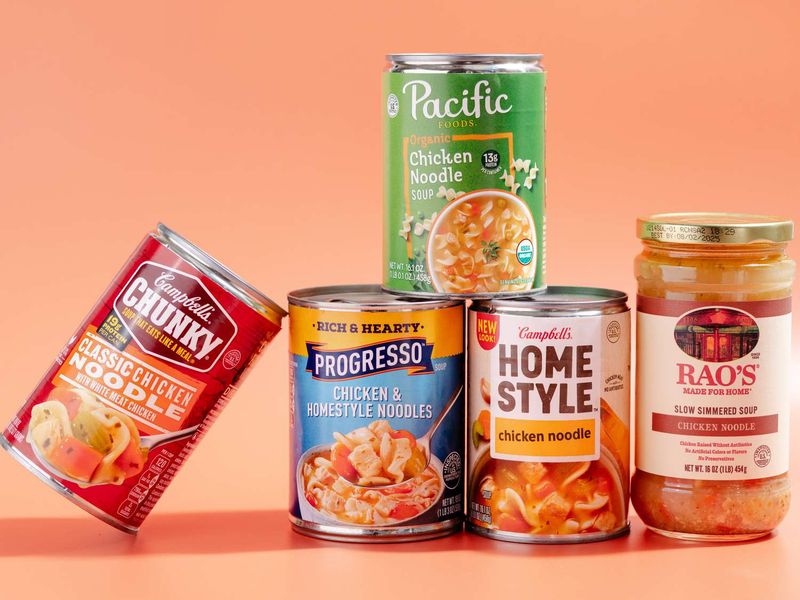
Canned soups are a convenient meal option, yet they often contain high levels of sodium and preservatives. Regular consumption can increase the risk of hypertension and water retention.
For a healthier alternative, try making homemade soups with fresh ingredients to control sodium levels and enhance flavor.
Did you know? Canned soups were introduced in the 19th century as a means of preserving food, but modern recipes often sacrifice nutrition for convenience. Consider checking labels for lower sodium options if opting for canned varieties.
11. Ice Cream

Ice cream, with its creamy texture and sweet flavors, is a beloved dessert, but it’s high in sugars and saturated fats. Regular indulgence can contribute to weight gain and insulin resistance.
For a healthier treat, try frozen yogurt or homemade fruit sorbets that offer natural sweetness and fewer calories.
A fun fact: ice cream gained popularity in the United States during the Prohibition era, as soda fountains replaced bars, offering sweet refuge during dry times. Today, moderation is key to enjoying this delightful treat without the guilt.
12. Microwave Popcorn

Microwave popcorn is a beloved movie night snack, yet it often contains unhealthy trans fats and artificial flavorings. These additives can increase cholesterol levels and contribute to heart disease.
Consider air-popping your popcorn and seasoning it with herbs for a healthier alternative.
Did you know? Popcorn has been enjoyed for thousands of years, with evidence of it being popped dating back to ancient Peru. While the convenience of microwave bags is undeniable, opting for air-popped versions ensures a heart-healthy indulgence.
13. Energy Drinks

Energy drinks promise a quick boost with their vibrant packaging and bold flavors, yet they are high in caffeine and sugars. Excessive consumption can lead to insomnia, increased heart rate, and anxiety.
For a healthier energy boost, consider coffee or green tea, which provide antioxidants along with caffeine.
Here’s a quirky tidbit: the first energy drinks were actually developed in Japan in the 1960s, initially aimed at boosting work productivity. Today, it’s wise to enjoy them sparingly to avoid health pitfalls.
14. White Bread

White bread, with its soft texture and mild flavor, is a staple in many households, yet it lacks fiber and essential nutrients. Regular consumption can lead to blood sugar spikes and increased hunger.
For a more nutritious option, choose whole-grain or multigrain breads that offer fiber and vitamins.
Did you know? The process of making white bread involves removing the bran and germ, stripping away key nutrients. Opting for whole grains ensures you’re getting the full nutritional benefits of the wheat kernel.
15. Commercial Fruit Juices

Commercial fruit juices may seem healthy, but they often contain added sugars and lack the fiber found in whole fruits. Regular consumption can lead to weight gain and dental issues.
For a healthier choice, opt for freshly squeezed juices or simply enjoy whole fruits to benefit from their fiber content.
An intriguing fact: fruit juices became popular in the 20th century as pasteurization techniques allowed for mass distribution, changing our perception of juice as a health drink despite the high sugar content.
16. Table Sauces
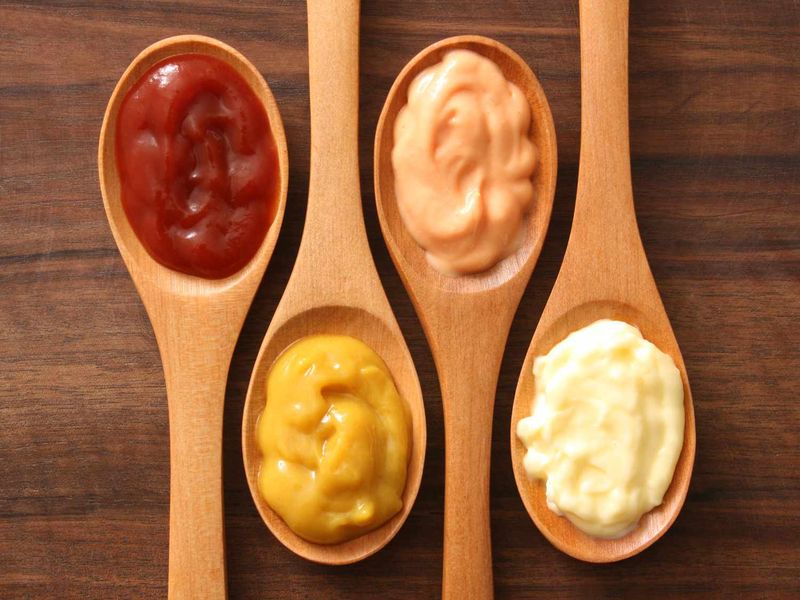
Table sauces, including ketchup and mustard, add flavor to meals but are often loaded with sugars and sodium. Regular use can contribute to increased calorie intake and elevated blood pressure.
Consider using fresh herbs and spices to enhance your meals without the added sugars.
Did you know? Ketchup originated as a fermented fish sauce in the 17th century before evolving into the sweet condiment we know today. While sauces add zest to dishes, mindful consumption helps maintain a balanced diet.
17. Flavored Yogurts
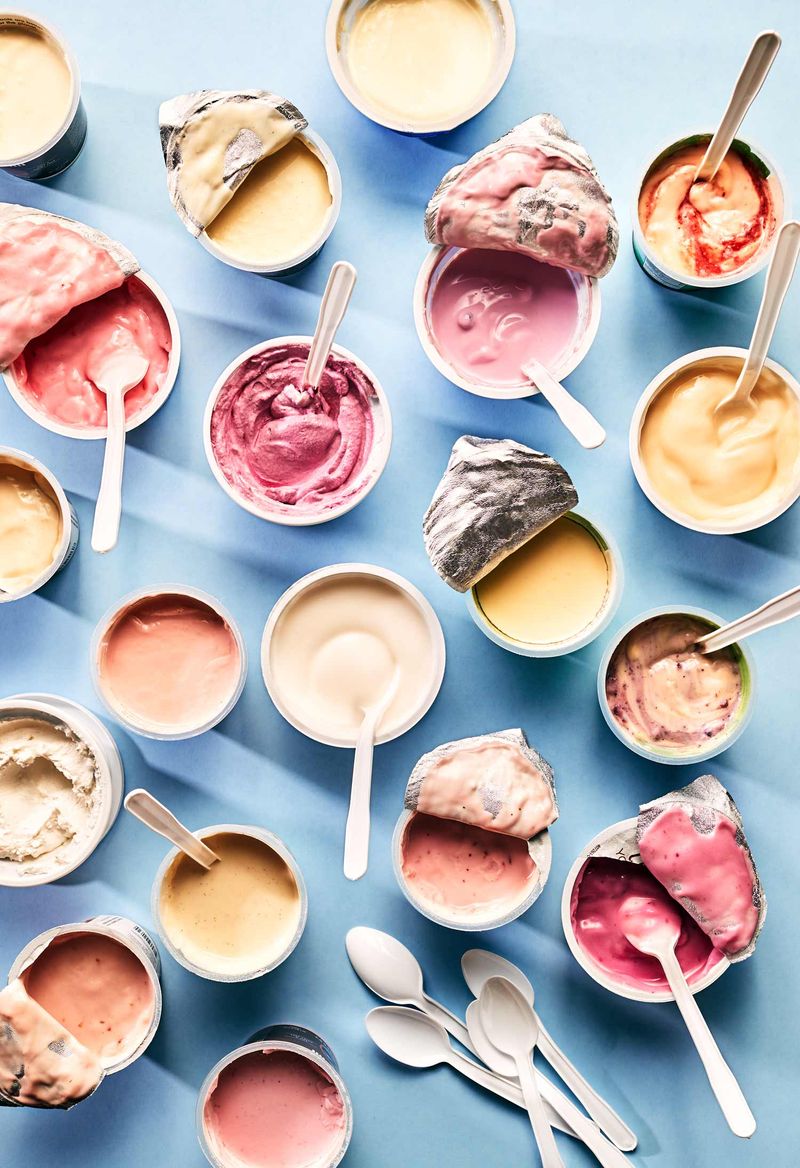
Flavored yogurts, with their creamy texture and fruity allure, can be deceptive as they often contain excessive sugars and artificial flavors. Regular consumption can lead to weight gain and spikes in blood sugar levels.
For a healthier alternative, opt for plain yogurt and add fresh fruits for natural sweetness.
A fun twist: Yogurt has been a staple in many cultures for centuries, but modern flavored varieties mask its natural health benefits with added sugars, making homemade options a wiser choice.
18. Fast Food Burgers

Fast food burgers, with their juicy patties and melted cheese, offer convenience and taste, yet they are high in calories, fats, and sodium. Frequent consumption can lead to weight gain and increased risk of heart disease.
For a healthier burger, opt for lean meats and whole-grain buns, and load up on fresh vegetables.
Did you know? The modern hamburger traces its roots back to the 19th-century Hamburg steak, but today’s fast food versions often come with a hefty health cost.
19. Candy Bars
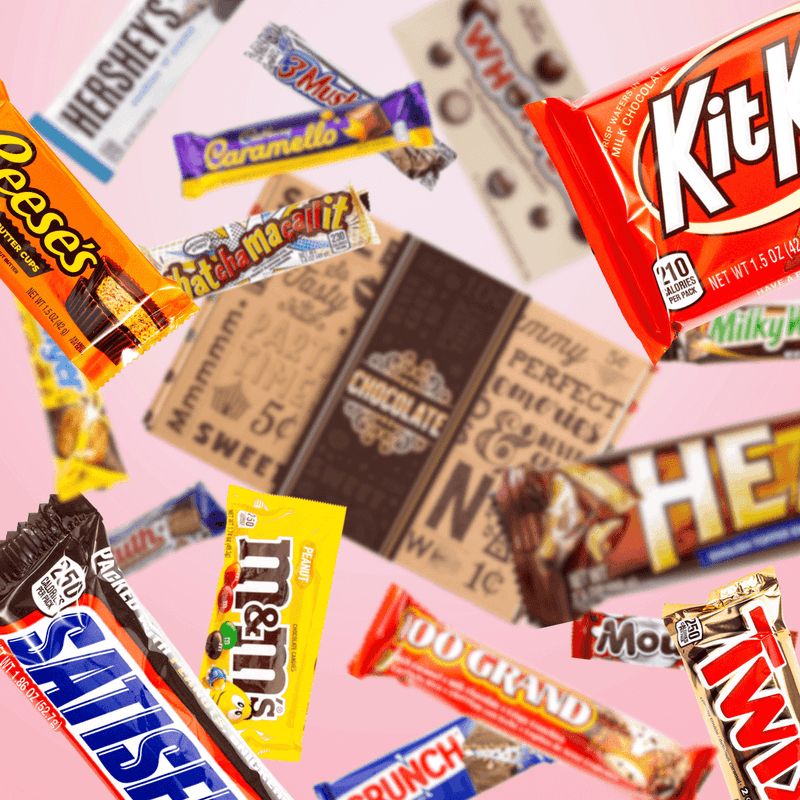
Candy bars, with their rich chocolate and nut fillings, are a quick sugar fix, but they are loaded with sugars and unhealthy fats. Regular consumption can lead to weight gain and dental problems.
For a sweet treat with a healthier twist, try dark chocolate or homemade nut bars with natural sweeteners.
Interestingly, the first chocolate bar was created in the 19th century in England, but modern candy bars have evolved into sugary delights that require mindful moderation for those watching their health.
20. Alcoholic Beverages

Alcoholic beverages, with their social allure, are often enjoyed in moderation, yet they are high in empty calories and can lead to addiction. Excessive consumption is linked to liver damage and other health issues.
For responsible enjoyment, consider moderation and choose lower-calorie options like wine spritzers or light beers.
Did you know? Alcohol has been consumed since ancient times, with evidence of fermented beverages dating back to 7000 BC. While it has its place in social settings, mindful consumption ensures it doesn’t compromise health.
